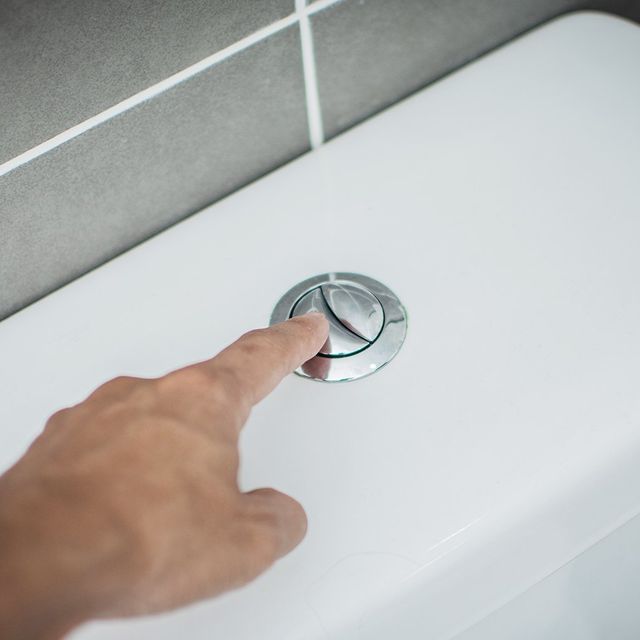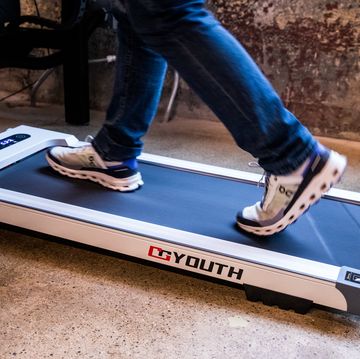When Charles Griffin, Jr., began experiencing sharp pain in his side, he knew something wasn’t right. During an ER visit, the doctor noted microscopic drops of blood in his stool tests, but chalked it up to hemorrhoids or stress.
After all, Griffin was in the best shape of his life, and only 32 years old. He worked out religiously, boasted a killer six-pack, and didn’t have a family history of colon cancer. Still, he asked his primary care doctor for a colonoscopy anyway.
Because of his low risk factors, his doctor balked, and so did a specialist. Griffin had to make the request five times before the specialist relented, simply to pacify him. It turned out he had a golf-ball-sized tumor in his colon, and he was at stage IV—meaning the cancer had already spread to distant organs.
RELATED: You Should Probably Be Getting an Annual Skin Cancer Exam
“Every day, I have to overcome my fears about a disease that ends in death more often than not at this stage,” he says. “I just tell my kids, I’m scared but I’m not going to quit.”
Colon cancer in young people is rare. According to the Centers for Disease Control and Prevention (CDC), the chance that a 30-year-old man would develop colorectal cancer before his 40th birthday is about 7 in 10,000.
That said, the problem is growing: Colon cancer rates have increased by 11 percent over the last 10 years in people under age 50. And like in Griffin’s case, younger people tend to be diagnosed at later stages, where the cancer is harder to cure.
When caught early, the chances of surviving colon cancer are pretty good—about 90 percent of people with localized cancer (meaning it hasn’t spread) survive at least five years, according to the National Cancer Institute’s Surveillance, Epidemiology, and End Results Program (SEER).
Once the cancer has spread to distant organs, the cure rate depends on what therapies are used and the extent of the cancer, according to Anton Bilchik, M.D., chief of gastrointestinal research at John Wayne Cancer Institute in Santa Monica. In some cases, the five-year survival rate can be about 20 percent, SEER notes.
“We see this all the time,” says Michael Sapienza, CEO of the Colorectal Cancer Alliance. “That’s why people need to know the signs, and more than that, they have to be their own health advocates.”
That’s why detection is key, particularly in young guys, since standard colonoscopy screenings don’t start until age 50. Here are seven symptoms to keep in mind.
Colon cancer sign: Blood in your stool or the toilet
This is the top symptom, and one that should get your attention the most.
In the case of colon cancer, blood can occur because the passage of feces tears at the tumor, causing it to bleed. If it’s in the upper colon, the blood is most likely to be in stool itself.
Bright red blood that appears on your toilet paper or as a few drops in the bowl—as opposed to in the stool itself—is often a minor condition, according to Matthew Mintz, M.D., an internist in Bethesda, Maryland.
He notes that this is especially true with young men, and the cause is most often hemorrhoids or a perirectal fissure. With these conditions, bleeding usually resolves with proper treatment, Dr. Mintz says, so any ongoing bleeding should prompt a visit to your doctor.
Colon cancer sign: Abdominal discomfort
Everyone gets a bout of gas or cramping from time to time, but if it’s unshakable, that could be a colon cancer symptom.
Polyps and tumors affect how your digestion operates—creating more inflamation in the colon—so you may notice changes like feeling full faster, or that your bowel isn’t emptying completely after you poop.
They may also cause blockages that stop gas and solids from passing, which causes your colon to cramp as a way to push them through. That abdominal pain is a presenting symptom in about 1 in 3 patients with colon cancer, and may be accompanied by distention, nausea, and vomiting, says Raed Al-Rajabi, M.D., oncologist at the University of Kansas Health System.
RELATED: 17 Over-the-Counter Medications and What They’re Best at Treating
“The pain doesn’t have to be sharp to be a concern,” adds Dr. Mintz. “Any persistent, unexplained abdominal pain should be investigated. In a young man, it’s still not likely to be colon cancer, but isn’t normal.”
Colon cancer sign: Night sweats
According to Sapienza, that drench-the-sheets effect you get when you have the flu could also be a symptom of cancer—not just of the colon, but also leukemia and lymphoma as well as other cancers.
This is seen in about 10 to 25 percent of patients with metastatic disease, and could be related to small perforations in the tumor, or the development of a liver abscess, says Dr. Al-Rajabi.
It’s what’s called a “systemic symptom” instead of a localized one, like abdominal cramps or stool changes. Night sweats can occur because your immune system is attempting to fight the cancer, especially if your condition is causing a fever. Your body sweats excessively as a cool-down measure.
“This isn’t one that’s commonly known, but we see it with a vast majority of the colon cancer patients we talk with,” says Sapienza. “On its own, it’s not a predictor. But when you combine it with other symptoms and they persist over a couple months, then that’s something to get checked.”
Often a symptom in more advanced cases, it’s likely to be paired up with other signs like blood in the stool or bowel issues, says Dr. Mintz. If you’ve only got night sweats, it’s probably not colon cancer, but it’s worth getting checked out, he adds.
Colon cancer sign: Thin stools
A change in shape from your norm could be an indication of problems inside your colon.
“If you notice thinning, that could be caused by a polyp or tumor blocking part of the colon,” says Anne Carlson, executive director of the Colon Cancer Coalition.
Changes in color should also set off your alarm bells, particularly if your poop seems darker. This could be an indication of blood or other changes.
RELATED: Can Stress Give Runners the Runs?
If you normally have thin stools, it’s probably not a concern, since poop comes in all sorts of shapes and forms, Dr. Mintz notes. It’s when your “normal” changes to being pencil-thin that it should get checked out.
Colon cancer sign: Constipation
Although thin stools are the most common symptom of bowel changes for colon cancer patients, you may also be experiencing constipation as well.
“Almost all men experience constipation at one point or another,” says Dr. Mintz, adding that it’s usually due a lack of fluid or fiber in the diet, and can also be a side effect of some medications. Constipation can cause you to feel bloated or generally unwell.
10 Foods to Make Yourself Poop:
Most of the time, it resolves with a dietary change, Dr. Mintz notes. However, constipation that persists despite making those shifts should be a clue that something may be wrong, he says.
Related: 5 Things You Must Try When You Just Can't PoopColon cancer sign: Sudden weight loss
Abrupt, unexplained weight loss—when you’re not trying to drop any pounds, that is—is a potential symptom of nearly every cancer, says Carlson, and colon cancer is no exception.
It could be caused by lower appetite, or it may be a blockage that prevents food from digesting properly. In either case, you’ll likely begin losing weight.
Colon cancer sign: Fatigue
“Generally, there will be a feeling of malaise, and you’re just not feeling like yourself,” Carlson says.
That can be especially true if you’ve had significant bleeding, because chronic blood loss can cause iron deficiency and anemia. As a result, you might feel tired all the time, and that can worsen if you’re also experiencing lower appetite.
RELATED: 5 Signs Your Exhaustion is a Symptom of a Much Bigger Problem
Everyone feels fatigued at some point due to stress, illness, and other factors, adds Dr. Mintz. But when it’s persistent and unexplained, it should be investigated.
Bottom line on colon cancer symptoms
Keep in mind that if you have colon cancer, you won’t be experiencing all of these symptoms. Griffin, for example, had only pain in his side, without any other signs.
Just having one of these symptoms isn’t an automatic cause for alarm—with the exception of blood in the stool, which should always prompt a talk with your doctor, says Dr. Mintz.
He adds that the most common culprit is hemorrhoids, so you may be treated for that possibility first. However, those almost always resolve with proper treatment, so if your symptoms aren’t getting better, Dr. Mintz advises that more testing is warranted.
Keep in mind you may need to advocate for more extensive testing, says Anjee Davis, president of the nonprofit initiative Fight Colorectal Cancer.
“The tendency for men, especially, is to ignore their symptoms,” she says. “Many times, I hear about people who are diagnosed with colon cancer and they admit to having blood in their stool for years. But the sooner you catch it, the better your outcome could be.”
* * *
The article 7 Signs of Colon Cancer You Should Never Ignore originally appeared on Men’s Health.













